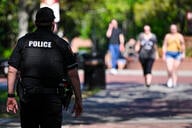You have /5 articles left.
Sign up for a free account or log in.
A few weeks ago, Yale University undergraduate David Light showed his collection of 11 guns to Christopher Keefer, who was visiting with his brother at the off-campus Beta Theta Pi fraternity house.
Then, at about 3 a.m. on Friday, July 13, gun shots rang out in the house. Keefer, who is in the Air Force, rushed to the living room, where he'd heard the shots. There, according to police reports, he found a visibly intoxicated Light with a gun in his hand and shell casings on a nearby table. Light responded to Keefer’s requests to put the gun down by firing two rounds of blanks at the ceiling and when Keefer tried to convince Light that blanks could also be dangerous, Light allegedly responded, “Why don’t I point it at your head to find out?”
When Light was arrested, a student who had stayed in the house for a few days and who had seen Light with suspicious-looking guns told the Yale Daily News , “it fell into place … I felt foolish that I didn't tell someone.”
Yale police arrested Light last Monday, charging him with unlawful discharge of a firearm, two counts of illegal possession of assault rifles, reckless endangerment in the first degree, threatening in the second degree and breach of peace in the second degree.
Since the April murders at Virginia Tech, politicians have been talking about the danger of mentally ill students on college campuses. Receiving less attention has been the issue of guns in fraternities, and in some cases, the results have been tragic.
Karl Joseph Hansen, a member of Pi Kappa Alpha at Kettering University, in Flint, Mich., was shot and killed at a party in an off-campus apartment shared by fraternity brothers. The shooter was one of his fraternity brothers, who was playing with the gun, which belonged to another brother, who had left it out. The gun accidentally discharged.
For the campus of 2,400 undergraduates, about a third of whom belong to fraternities and sororities on a campus that is 85 percent male, the death hit hard. “It was one of the saddest funerals I’ve ever attended … on a small campus the loss is felt particularly strongly,” Pat Mroczek, a spokeswoman said. “There was a large contingent of members of the Greek community there, mourning Karl.”
The university, she said, will evaluate its gun policies in the coming months. It already bans weapons in dorms and on university property.
In November, while investigating the shooting of a homeless man in an alley behind several fraternity houses at Oregon State University in Corvallis, police found more than two dozen guns at the Alpha Gamma Rho house and in members' cars, only some guns stored in secured places.
During the investigation, members told police they were frustrated that transients entered the house without permission and at least two told police they had shot at transients with BB guns.
In April, after pleading guilty to weapons and assault charges, Alpha Gamma Rho member Joshua Grimes was sentenced to 150 days in jail, three years of probation, $3,000 in fines and 400 hours of community service at a homeless shelter.
The fraternity, on its part, now requires members’ guns to be stored in a safe and for the president and House Dad to be present when the safe is unlocked for a member taking out his gun. Members can no longer store guns in their cars.
Over the last few years, fraternity members at Dartmouth College, the University of California at Berkeley and the University of Michigan at Ann Arbor have gotten in trouble for shooting BB guns at members of their fraternities or unsuspecting people on campus.
Fraternity members are not the only undergraduates who own guns, but Greeks are more likely to own them.
While 5.2 percent of fraternity and sorority members surveyed in the 2001 Harvard School of Public Health College Alcohol Survey owned guns, 4.1 percent of non-Greek undergraduates were gun owners.
Matthew Miller, an assistant professor of health policy and management at Harvard University and the primary author of the study , said that “the kinds of behavior that students who have guns exhibit are also the kinds of behavior that students in fraternities often demonstrate,” listing binge drinking, driving while intoxicated and “general aggression” as behaviors associated with fraternity members.
“There’s a decent chance that at any school where students have guns, members would be more likely to have guns than other students,” Miller said. “And they’d probably be engaging in riskier behavior, maybe with their guns.”
Brian J. Siebel, senior attorney at the Brady Center to Prevent Gun Violence, said that because “the ages of 18 to 24 are the most volatile time period in peoples’ lives, bringing guns into settings like fraternities, where there may be drinking or other careless activities seems particularly hazardous.”
Thinking that only a student with documented mental health problems like Virginia Tech shooter Seung-Hui Cho could commit a murder on campus is a mistake on the part of administrators, Siebel said. “Cho may have acted strangely … and been perceived to be dangerous by other people, but a host of people who’ve committed crimes with guns were not perceived to be dangerous before committing a shooting.”
Mental health advocacy groups like the Bazelon Center for Mental Health Law also resist the characterization of a student who commits a gun crime as mentally ill. “Because there’s a stigma attached to being mentally ill, it’s easy for people to say that they’re the ones who hurt and kill people,” Lee Carty, the center’s director of communications, said. “But it’s more likely to be someone who’s not mentally ill.”
“And if anything,” she added, “I’d expect more crimes where substance abuse is involved,” as it might be in hard-partying fraternities, where the use of alcohol and drugs is commonplace.
Katherine Newman, a professor of sociology at Princeton University and the author of Rampage: The Social Roots of School Shootings, a book that received attention following the Virginia Tech shootings, said that “as a university professor myself, I shudder at the idea that students have guns, particularly fraternity kids who are known to drink to excess.”
Based on her studies, Newman said, gun incidents at fraternity houses are more likely not to be random rampages but rather to fit the pattern of recent accidental and drunken shootings. “Drinking is never good for judgment and throwing guns into the mix is just asking for a tragedy,” she said. “But I wouldn’t expect the kind of tragedy we saw in Virginia Tech, which would be small comfort to anyone affected.”
Light, who was to begin his junior year at Yale in the fall, was placed on emergency suspension, which remains in effect until the fall when the case will be heard by a college committee. University police transferred him to the custody of the New Haven Police Department and he was released on Tuesday after posting a $150,000 bond.
Fraternities, for their part, acknowledge the dangers of guns in the hands of college students but defend their members. “Members of fraternities are a reflection of the general population of colleges and universities across the nation,” Peter Smithheisler, vice president of the North American Interfraternity Conference, said. “But I would agree we need to be conscious of guns, whether in a fraternity or any other environment."




